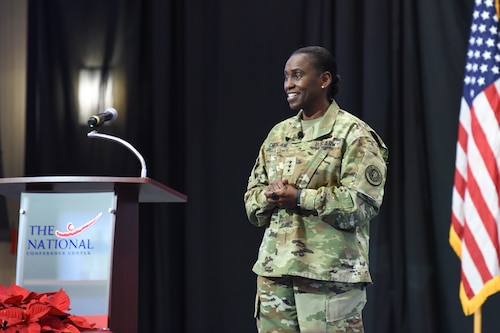Part one of a five-part series covering the Air Force and Space Force surgeon general's annual leadership workshop.
Lt. Gen. John J. DeGoes, U.S. Air Force and Space Force surgeon general, and Chief Master Sgt. James Woods, Medical Enlisted Force and Enlisted Corps chief, kicked off the annual four-day Senior Leadership Workshop on Dec. 3. This year's theme was: "The Air Force Medical Service at 75 … Mission Ready, Operationally Relevant!"
DeGoes and Woods highlighted the top three key operational medical priorities to ensure Airmen and Guardians are mission ready. These include integrated operational medical capabilities; caring for Airmen, Guardians, and families; and, partnering with the Defense Health Agency to deliver health care benefits for all beneficiaries.
While celebrating 75 years of the Air Force Medical Service community, Air Force medical leaders at the workshop discussed how the Air Force Medical Command transition will enhance the ability of warfighters to deploy at a moment's notice and provide optimized health care delivery and support.
"I have two goals for all of you this week. Understand where we're going with Air Force Medical Command under the Air Force Medical Service, aligning our mission from senior leadership to all medical treatment facilities, and instill confidence that the plans we're talking about are doable. At the headquarters, we are laser-focused on giving our medics the tools to be successful." - U.S. Air Force and Space Force Surgeon General Lt. Gen. John DeGoes
"The readiness mission has always been at the heart of AFMS," Woods added.
During the workshop, two Airmen received special recognition for earning awards that showcased their dedication to their creed as Air Force medics. Senior Airman Rachel Heath, from the 377th Medical Group, was recognized as one of 12 of the Air Force's Outstanding Airmen of the Year for her superior leadership, job performance, and community involvement. Staff Sgt. Devann Jordan earned the 2024 Angels of the Battlefield award, which pays tribute to military medical personnel for their life-saving medical treatment and trauma care of service members, partner forces, and civilians at home and abroad.
Fitting the day's theme of generating mission ready medics, Brig. Gen. John Andrus, Joint Staff surgeon, and Chief Master Sgt. Thomas Wigington, senior enlisted advisor to the Joint Staff Surgeon, gave a presentation on accepting change to address tomorrow's challenges. They encouraged leaders to engage with and guide Airmen from all levels in the conversation of meeting future requirements.
"We are operating in an environment that is ever-changing, so we have to adapt and adjust for the future fight," Andrus said. "We are training leaders to be decision-makers, to have faith and confidence in their choices … let's have those conversations early. Empower your people."
As the Department of Air Force establishes AFMEDCOM, its partnership with the DHA remains critical to health care delivery at home especially as warfighters serve in contingency operations. U.S. Army Lt. Gen. Telita Crosland, DHA director, discussed the agency's strategies to modernize the health care delivery model and drive better patient outcomes within the new AFMEDCOM structure. She previewed DHA's plan to make the care experience more accessible, personalized, and connected for patients, providers, and health care staff through mobile applications for virtual care.
"We look at care through a patient-centric lens. We care about patient experience because it matters to their outcome," Crosland said.
Day one continued with presentations from Brig. Gen. David Epperson, special assistant to the Air Force Chief of Staff and Col. Tracy L. Allen, director of expeditionary medical policy and operations. They respectively spoke about developments in units of action and optimizing the future force presentation model for great power competition.
Additionally, the Integrated Operational Support team, represented by Col. Amalia Divittorio, IOS chief, and Col. Lauren Wolf, chief of clinical quality management, discussed how IOS programming continues to positively impact operational units with embedded clinical care tailored to each unit's mission and its sustained relevance to delivering safe, quality care.
As the day concluded, DeGoes and Woods hosted a Q&A session and shared closing remarks to inspire and refocus senior leaders in attendance.
"This workshop is more than an exchange of ideas," DeGoes said. "It's about creating a unified vision for the future of Air Force medicine. Every decision we make, every initiative we start, must serve one purpose: ensuring we are ready to meet the demands of tomorrow's fight. Your leadership is critical to making this vision a reality."
Woods echoed these sentiments, emphasizing the importance of mentorship and teamwork.
"Our medics are the heart of this mission," Woods said. "As leaders, it's our duty to cultivate their potential, provide them with the tools they need, and show them that their efforts are the foundation of our success. Let's carry this momentum forward - together."








